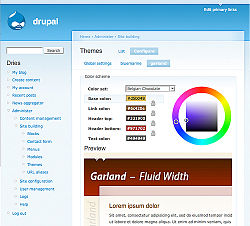Drupal is a free software package that allows anyone to easily publish, manage and organize a wide variety of content on a website. Hundreds of thousands of people and organizations are using Drupal to power an endless variety of sites.
Drupal is written in PHP and distributed under the GNU General Public License. It is used as a back-end system for at least 1.5% of all websites worldwide ranging from personal blogs to corporate, political, and government sites including whitehouse.gov and data.gov.uk It is also used for knowledge management and business collaboration.
Drupal provide a number of features, including:
Access statistics and logging
Advanced search
Blogs, books, comments, forums, and polls
Caching and feature throttling for improved performance
Descriptive URLs
Multiple-level menu system
Multiple-site support
Multiple-user content creation and editing
OpenID support
RSS Feed and Feed Aggregator
Security/new release update notification
User profiles
Various access control restrictions (user roles, IP addresses, email)
Workflow tools (Triggers and Actions)
Website
More information
Using Drupal
Drupal For Dummies
Cracking Drupal: A Drop in the Bucket
Drupal For Dummies
Sams Teach Yourself Drupal in 24 Hours





